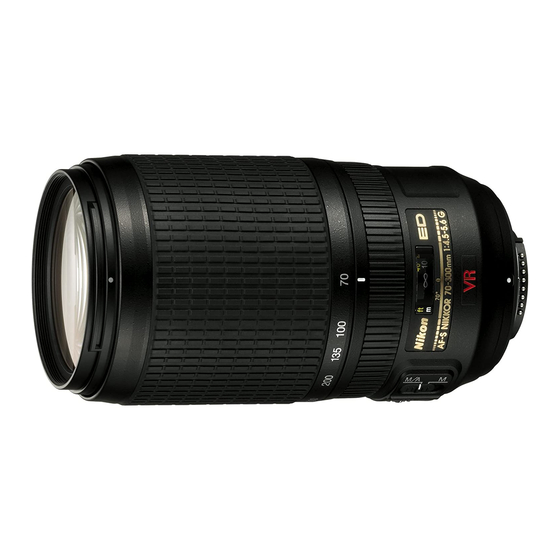Nikon AF Zoom-Nikkor 70-300mm f/4-5.6G Brochure & Specs - Page 15
Browse online or download pdf Brochure & Specs for Camera Lens Nikon AF Zoom-Nikkor 70-300mm f/4-5.6G. Nikon AF Zoom-Nikkor 70-300mm f/4-5.6G 18 pages. Nikon d200: product brochure

PC-E
NIKKOR Lenses
PC-E Micro NIKKOR 45mm f/2.8D ED
© Nikon
Perspective distortion is corrected by shifting the lens up
Tilting the lens achieves focus on a
specific part of the subject
28
PC-E NIKKOR lenses —
distinguishing features
P
C-E NIKKOR lenses, with
their Perspective Control
capability, are equipped with
a tilt/shift mechanism that
enables photographers to
emphasise or correct far and
near perspective, control
depth of field, resolve distor-
tions caused by the camera
angle, and achieve the
desired focus throughout the
entire subject plane, even
when it is not parallel to the
camera's focal plane.
F
urthermore, these lens-
es incorporate numerous
state-of-the-art Nikon opti-
cal features and technolo-
gies that ensure superior
picture quality even at the
maximum tilt and/or shift set-
tings.
T
he
diaphragm
these lenses enables auto
aperture control when used
with
compatible
models.
I
n addition to applications
with subject matter that
requires perspective control,
such as architecture, land-
scapes
products, these lenses are
also ideal for various other
situations, such as close-up
photography.
Without tilting
PC-E Micro NIKKOR 85mm f/2.8D
© N.Yuasa
PC-E NIKKOR 24mm f/3.5D ED
PC-E Micro NIKKOR 45mm f/2.8D ED
electromagnetic
employed
in
camera
and
commercial
PC-E Micro NIKKOR 85mm f/2.8D
Notes:The Nikon D3 can be used without any limitation. With other cameras, there are limitations in tilt/shift operation.
The Nikon F90X series, F90 series, F70, F60D, F55, F50D, F-401 series, F-801 series, F-601, F-601M, F3AF, F-501,
PRONEA S or MF cameras cannot be used.
e a d s
High-performance wideangle lens with
Perspective Control
• Wide shifting and tilting range (shift: ±11.5mm;
tilt: ±8.5°)
• ±90° lens revolving capability for versatile
tilt/shift effects
Lens construction: 13 elements in 10 groups
Closest focusing: 0.21m/0.75 ft.
• Maximum reproduction ratio of 1/2.7 (at
Picture angle with Nikon DX Format: 35mm
0.21m/0.75 ft.)
(135) format equivalent to 36mm
• Three ED glass elements, and three aspherical
Filter attachment size: 77mm
lenses
Hood: HB-41
• Nano Crystal Coat reduces ghost and flare for
Dimensions: Approx. 82.5 x 108mm
Weight: Approx. 730g
clear images
• Nine-blade rounded diaphragm
• Auto aperture control with electromagnetic
diaphragm (with D3 and D300)
e c d s
Normal lens with Perspective Control and
Lens construction: 9 elements in 8 groups
Closest focusing: 0.253m/0.83 ft.
macro capability
Picture angle with Nikon DX Format:
• Wide shifting and tilting range (shift: ±11.5mm;
35mm (135) format equivalent to 67.5mm
tilt: ±8.5°)
Filter attachment size: 77mm
• ±90° lens revolving capability for versatile
Hood: HB-43
tilt/shift effects
Dimensions: Approx. 82.5 x 112mm
Weight: Approx. 740g
• Maximum reproduction ratio of 1/2 (at
0.253m/0.83 ft.)
• ED glass element
• Nano Crystal Coat
reduces ghost and
flare for clear images
• Nine-blade rounded
diaphragm
• Auto aperture control
with electromagnetic
diaphragm (with D3
and D300)
Entire subject plane is in focus with tilting
Without tilting
c d s
Medium telephoto lens with Perspective
Lens construction: 6 elements in 5 groups
Closest focusing: 0.39m/1.3 ft.
Control and macro capability
Picture angle with Nikon DX Format:
• Wide shifting and tilting range (shift: ±11.5mm;
35mm (135) format equivalent to 67.5mm
tilt: ±8.5°)
Filter attachment size: 77mm
• ±90° lens revolving capability for versatile
Hood: HB-22
tilt/shift effects
Dimensions: Approx. 83.5 x 107mm
Weight: Approx. 635g
• Maximum reproduction ratio of 1/2 (at
0.39m/1.3 ft.)
• Nano Crystal Coat reduces ghost and flare for
clear images
• Nine-blade rounded diaphragm
• Auto aperture control with electromagnetic
diaphragm (with D3 and D300)
: Nano Crystal Coat
: ED glass elements
: Aspherical lens elements
29
